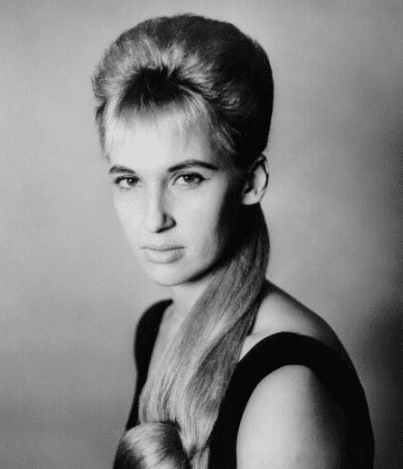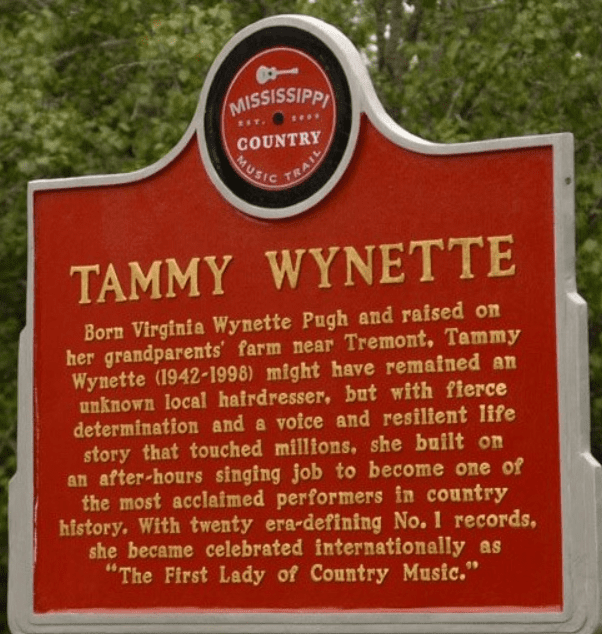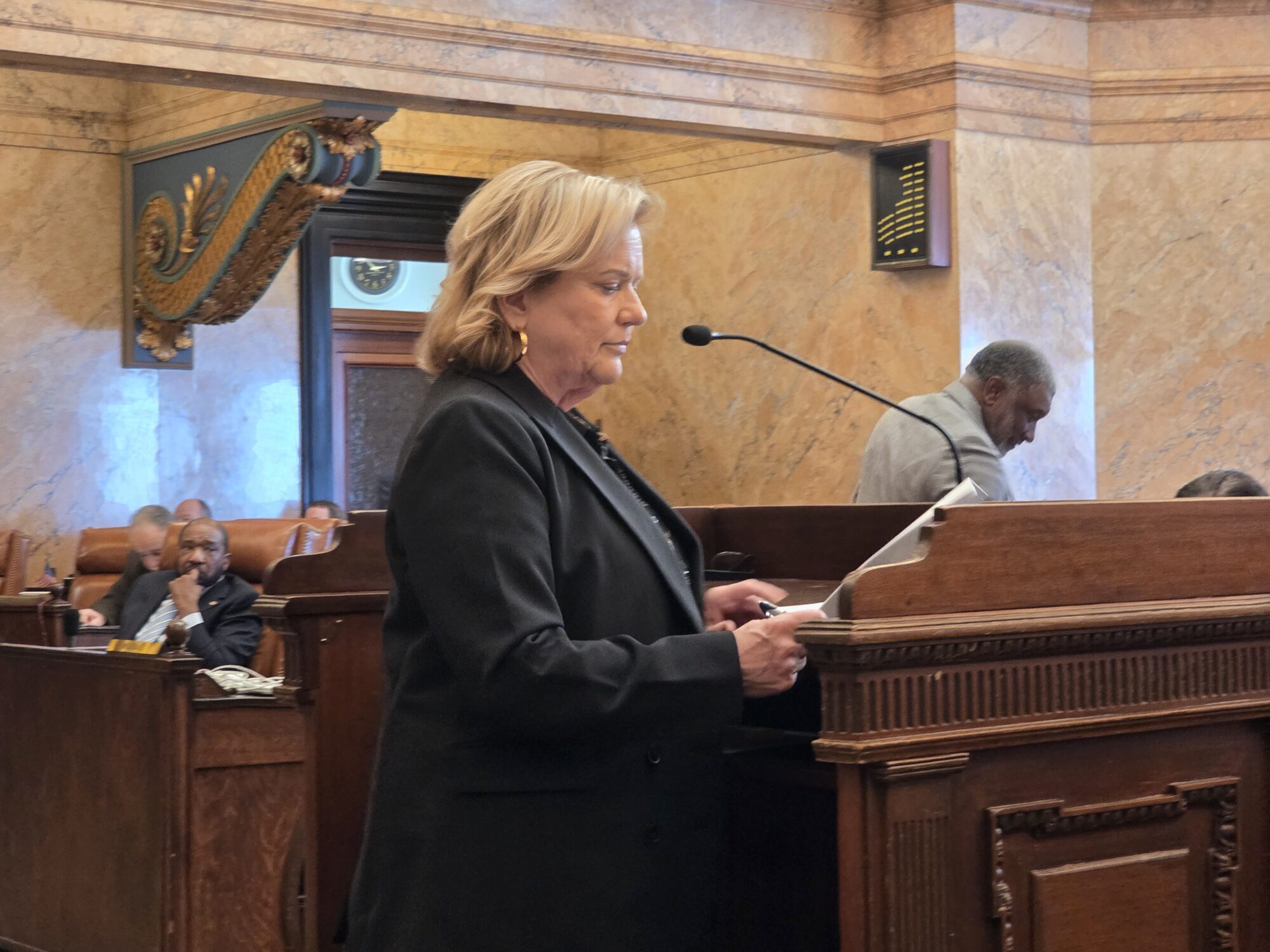
American country music singer-songwriter Tammy Wynette (1942 - 1998), 3rd April 1975. (Photo by Michael Putland/Getty Images)
- The life of Tammy Wynette is memorialized in Tremont where visitors get a glimpse of the dreams of a little girl playing piano and singing hymns in a country church.
Born in the small town of Tremont in Itawamba County, Mississippi in May 1942, little VIrginia Wynette Pugh grew up to be one of country music’s most influential and successful artists.
Raised by her mother, stepfather and her maternal grandparents, Wynette, as she was known as a child, had aspirations early on of becoming a singer. Time spent picking cotton on her family’s farm and hating every minute of it further fueled her desire. She took piano lessons as a child, but when she discovered she could play by ear, she told her mother not to waste her money on lessons.
During her teen years she performed music with two of her friends and the three formed a trio called Wynette, Linda & Imogene and sang Gospel music together. The girls loved to listen to music, including records by Ernest Tubb and Hank Williams. Word of the girls’ harmonies reached a local Methodist minister who had an early-Saturday morning radio program on WERH. He invited them to sing on his show.
While at Tremont High School, where she was voted “Miss Tremont High,” Wynette began smoking cigarettes and dating boys. At age 17, she married a local boy, Euple Byrd. They eventually moved to a small apartment in Tupelo and had their first child. The couple then moved to Red Bay, Alabama where Byrd found a job. While there, Wynette attended Mrs. McGuire’s School of Beauty. Before she finished, however, Byrd found work in Memphis, so the young family moved to Tennessee.
Wynette worked as a barmaid in Memphis and often sang for the customers. The bar owner and the bar’s in-house piano player recognized true talent when they saw it. They encouraged Wynette to move to Nashville. Instead, her little family moved back to Tupelo where she finished cosmetology school. Wynette renewed her license every year, even after she became famous in the music industry, just in case she needed to go back to a steady job.

After divorcing Byrd, Wynette (pregnant with her third child) moved to Birmingham where she lived with her paternal grandparents and attended beauty school again, because her license wouldn’t transfer to Alabama. Her grandparents encouraged her to pursue a music career. Her uncle helped Wynette get an audition for the Country Boy Eddie country music show on WBRC-TV in Birmingham, where she sang Patsy Cline’s Sweet Dreams. Wynette was a hit and began performing on the program each morning from 6:00am to 8:00am before going to school and then to work at a local beauty salon.
Wynette met Birmingham disc jockey Fred Lehner at WYAM radio. He also encouraged her to go to Nashville. In January 1966, Wynette packed her three children and all their belongings into a car and moved to Nashville. She moved into a room in the Anchor Motel while she worked to secure a record contract. It was at that hotel that she met her second husband, Don Chapel.
Chapel and Wynette put together a road show and performed in several states. She signed a recording contract with Epic Records within a year of arriving in Nashville. Billy Sherrill, a producer for Epic, changed Wynette’s name from Wynette Byrd to Tammy Wynette, saying she looked like a Tammy to him. Her first recording for Epic was Apartment No. 9 by Bobby Austin. The single reached the Top 50 on the American Billboard Hot Country Songs chart.
Wynette’s breakthrough came with the Epic release, Your Good Girl’s Gonna Go Bad. Her album by the same name reached number seven on the Billboard country album chart.
More hits followed, including Take Me to Your World, D-I-V-O-R-C-E, and Stand By Your Man, which drew flack from the feminist movement. But that didn’t stop the song from rising in the music charts in both the United State and the United Kingdom.
Wynette became a member of the Grand Ole Opry and won her second Grammy in 1969, as well as being honored as the 1969 Top Female Vocalist by the Country Music Association, and Female Vocalist of the Year in 1968, 1969 and 1970.
Her career continued to soar with chart-topping singles and a series of six original studio albums recorded between 1969 and 1970. More singles and albums followed.

Wynette married George Jones in 1969 and the couple toured and sang together. They finally recorded an album together in 1971, after Jones was released from his previous record contract. Their first single was a remake of Take Me, a song Jones had recorded as a solo release. The duet climbed to the number nine spot on the Billboard country chart.
Wynette and Jones released seven studio albums on the Epic label, making them country music’s most well-known and successful duet. Their tour bus was painted with “Mr. and Mrs. Country Music.”
The couple’s marriage had challenges, many of which stemmed from Jones’ abuse of alcohol. They divorced; then determined to make the marriage work, they remarried in 1973. Jones and Wynette had one child, Wynette’s fourth daughter, Georgette Jones, who now has a strong music career of her own. The couple split for good in 1975, yet continued to record together. They performed together at Wembley Stadium and for an HBO special.
For the next decade, Wynette was a solo act, hiring the Gatlin Brothers to be her road band. She married songwriter George Richey, who also served as her full-time manager.
Wynette continued to record into the 1990s, including collaborations with Emmylou Harris, Ricky Skaggs, Larry Gatlin and others. She even strayed from country with a pop release, Justified and Ancient (Stand by the JAMS), which received airplay on MTV and reached number one on music charts in 18 countries.

In 1993, she joined two other country megastars, Loretta Lynn and Dolly Parton, to record the studio album Honky Tonk Angels. The following year she released Without Walls, a studio album of duets with Melissa Etheridge, Elton John, Sting and other notable artists of the time. The single Girl Thang from the album, recorded with Wynonna Judd, was among Wynette’s final charting singles.
By 1995, Wynette was dropped by Epic. She continued to attract crowds to her concerts, and even recorded a re-make of In My Room with The Beach Boys’ Brian Wilson.
Wynette died on April 6, 1998, at home in Nashville. The cause of death of the 55-year-old was a pulmonary blood clot. A memorial service was held at the Ryman Auditorium, attended by 1,500 people and broadcast live on CNN and The Nashville Network.

The life of Tammy Wynette is memorialized at the Tammy Wynette Legacy Park in Tremont, Mississippi. The museum gives visitors a glimpse back in time to the dreams of a little girl playing piano and singing hymns in a country church to becoming a country music legend. The Country Music Trail Marker for Tammy Wynette is situated in front of the museum for all our visitors to enjoy.
While visiting the museum, you can also enjoy lunch or dinner while being serenaded by local musicians with hopes of following in Tammy’s footsteps one day.











